AI's Transformative Role in Modern Accounting: A Study
VerifiedAdded on 2020/04/01
|15
|3355
|385
Report
AI Summary
This report examines the integration of Artificial Intelligence (AI) in accounting, exploring its impact on future practices. It begins with an introduction and research question focusing on AI's role in accounting and decision-making. A literature review highlights the benefits of AI, such as improved efficiency and decision-making, while also acknowledging potential challenges. The report then details qualitative research methods like document analysis and discusses their application. The discussion section presents arguments for and against AI adoption, covering benefits like automation and enhanced accuracy, as well as drawbacks like implementation costs and limitations. Data analysis methods are also described. The conclusion synthesizes the findings, emphasizing the significant role of AI in transforming accounting, and offering insights into future trends and challenges. The report references various sources and includes an appendix for further details.

RUNNING HEAD: AI and future accounting
AI and future accounting
AI and future accounting
Paraphrase This Document
Need a fresh take? Get an instant paraphrase of this document with our AI Paraphraser
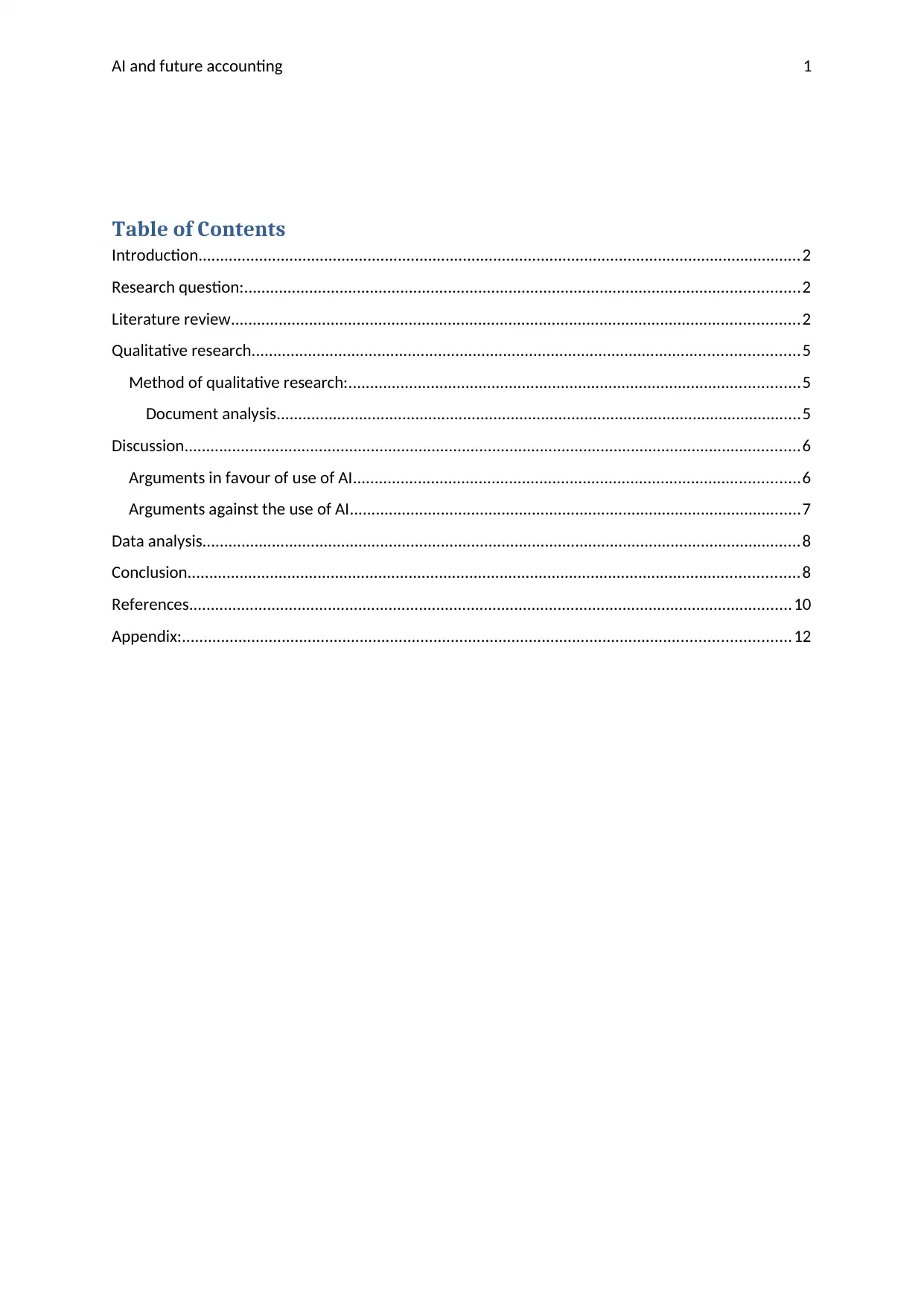
AI and future accounting 1
Table of Contents
Introduction...........................................................................................................................................2
Research question:................................................................................................................................2
Literature review...................................................................................................................................2
Qualitative research..............................................................................................................................5
Method of qualitative research:........................................................................................................5
Document analysis.........................................................................................................................5
Discussion..............................................................................................................................................6
Arguments in favour of use of AI.......................................................................................................6
Arguments against the use of AI........................................................................................................7
Data analysis..........................................................................................................................................8
Conclusion.............................................................................................................................................8
References...........................................................................................................................................10
Appendix:............................................................................................................................................12
Table of Contents
Introduction...........................................................................................................................................2
Research question:................................................................................................................................2
Literature review...................................................................................................................................2
Qualitative research..............................................................................................................................5
Method of qualitative research:........................................................................................................5
Document analysis.........................................................................................................................5
Discussion..............................................................................................................................................6
Arguments in favour of use of AI.......................................................................................................6
Arguments against the use of AI........................................................................................................7
Data analysis..........................................................................................................................................8
Conclusion.............................................................................................................................................8
References...........................................................................................................................................10
Appendix:............................................................................................................................................12
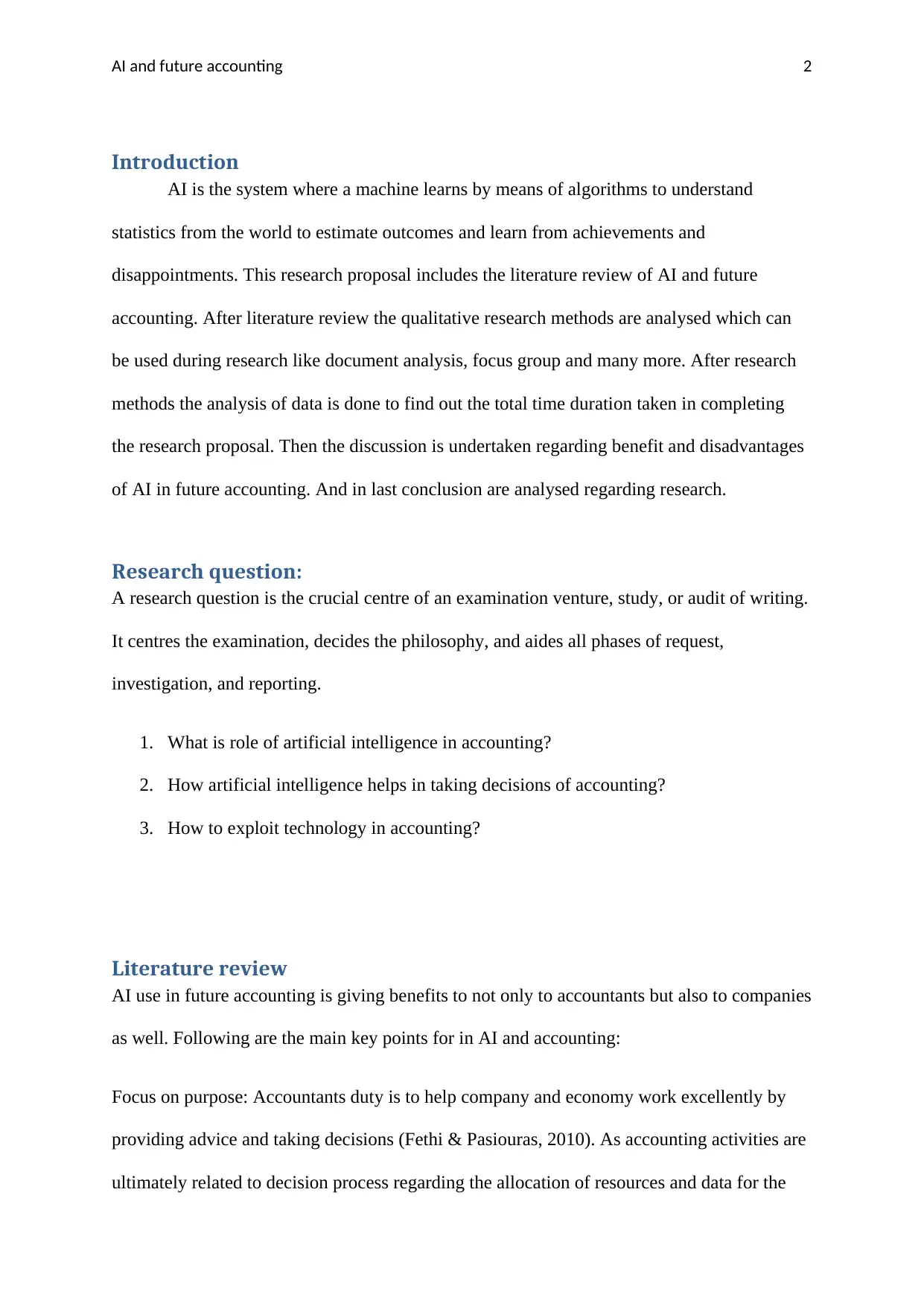
AI and future accounting 2
Introduction
AI is the system where a machine learns by means of algorithms to understand
statistics from the world to estimate outcomes and learn from achievements and
disappointments. This research proposal includes the literature review of AI and future
accounting. After literature review the qualitative research methods are analysed which can
be used during research like document analysis, focus group and many more. After research
methods the analysis of data is done to find out the total time duration taken in completing
the research proposal. Then the discussion is undertaken regarding benefit and disadvantages
of AI in future accounting. And in last conclusion are analysed regarding research.
Research question:
A research question is the crucial centre of an examination venture, study, or audit of writing.
It centres the examination, decides the philosophy, and aides all phases of request,
investigation, and reporting.
1. What is role of artificial intelligence in accounting?
2. How artificial intelligence helps in taking decisions of accounting?
3. How to exploit technology in accounting?
Literature review
AI use in future accounting is giving benefits to not only to accountants but also to companies
as well. Following are the main key points for in AI and accounting:
Focus on purpose: Accountants duty is to help company and economy work excellently by
providing advice and taking decisions (Fethi & Pasiouras, 2010). As accounting activities are
ultimately related to decision process regarding the allocation of resources and data for the
Introduction
AI is the system where a machine learns by means of algorithms to understand
statistics from the world to estimate outcomes and learn from achievements and
disappointments. This research proposal includes the literature review of AI and future
accounting. After literature review the qualitative research methods are analysed which can
be used during research like document analysis, focus group and many more. After research
methods the analysis of data is done to find out the total time duration taken in completing
the research proposal. Then the discussion is undertaken regarding benefit and disadvantages
of AI in future accounting. And in last conclusion are analysed regarding research.
Research question:
A research question is the crucial centre of an examination venture, study, or audit of writing.
It centres the examination, decides the philosophy, and aides all phases of request,
investigation, and reporting.
1. What is role of artificial intelligence in accounting?
2. How artificial intelligence helps in taking decisions of accounting?
3. How to exploit technology in accounting?
Literature review
AI use in future accounting is giving benefits to not only to accountants but also to companies
as well. Following are the main key points for in AI and accounting:
Focus on purpose: Accountants duty is to help company and economy work excellently by
providing advice and taking decisions (Fethi & Pasiouras, 2010). As accounting activities are
ultimately related to decision process regarding the allocation of resources and data for the
⊘ This is a preview!⊘
Do you want full access?
Subscribe today to unlock all pages.

Trusted by 1+ million students worldwide
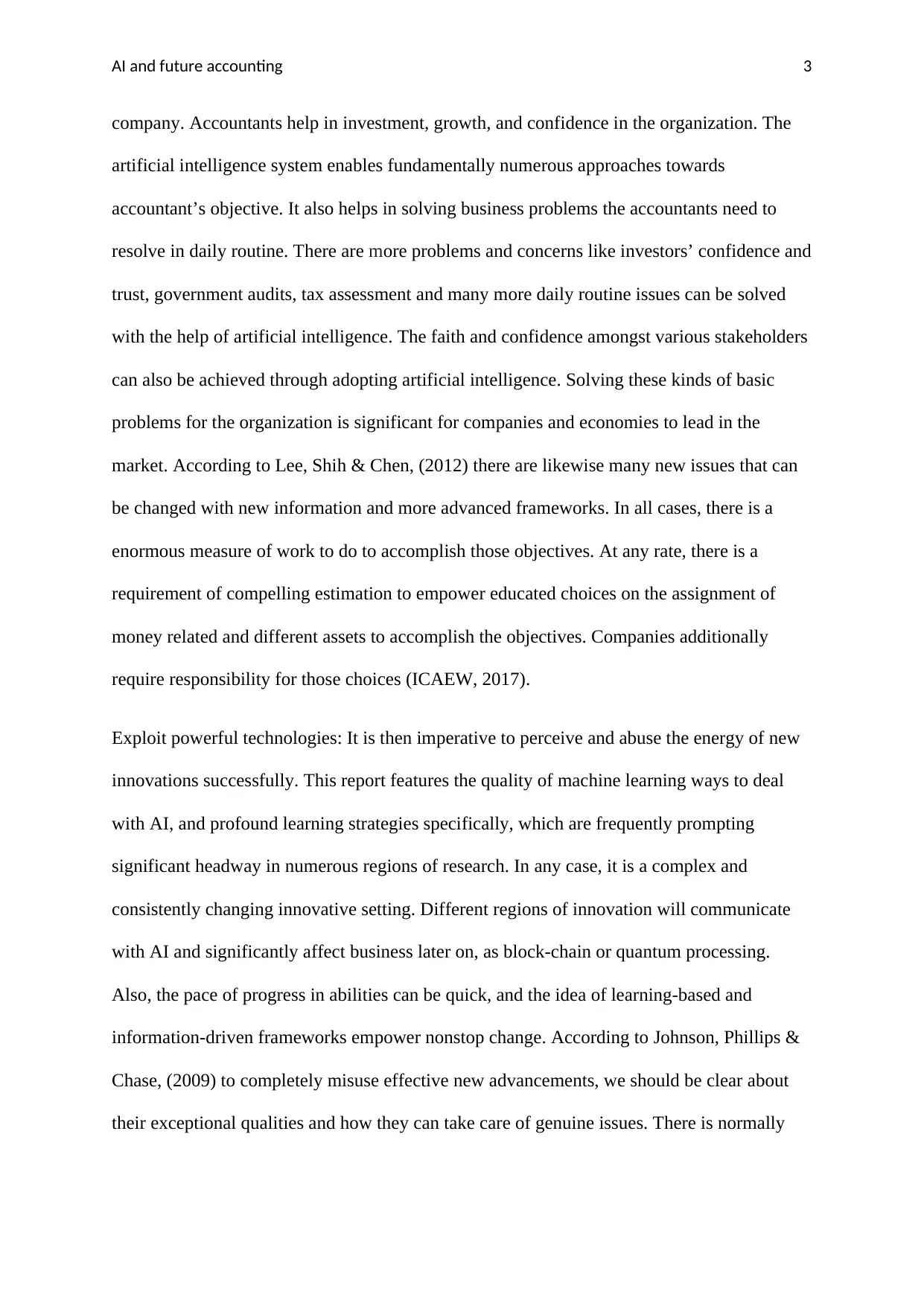
AI and future accounting 3
company. Accountants help in investment, growth, and confidence in the organization. The
artificial intelligence system enables fundamentally numerous approaches towards
accountant’s objective. It also helps in solving business problems the accountants need to
resolve in daily routine. There are more problems and concerns like investors’ confidence and
trust, government audits, tax assessment and many more daily routine issues can be solved
with the help of artificial intelligence. The faith and confidence amongst various stakeholders
can also be achieved through adopting artificial intelligence. Solving these kinds of basic
problems for the organization is significant for companies and economies to lead in the
market. According to Lee, Shih & Chen, (2012) there are likewise many new issues that can
be changed with new information and more advanced frameworks. In all cases, there is a
enormous measure of work to do to accomplish those objectives. At any rate, there is a
requirement of compelling estimation to empower educated choices on the assignment of
money related and different assets to accomplish the objectives. Companies additionally
require responsibility for those choices (ICAEW, 2017).
Exploit powerful technologies: It is then imperative to perceive and abuse the energy of new
innovations successfully. This report features the quality of machine learning ways to deal
with AI, and profound learning strategies specifically, which are frequently prompting
significant headway in numerous regions of research. In any case, it is a complex and
consistently changing innovative setting. Different regions of innovation will communicate
with AI and significantly affect business later on, as block-chain or quantum processing.
Also, the pace of progress in abilities can be quick, and the idea of learning-based and
information-driven frameworks empower nonstop change. According to Johnson, Phillips &
Chase, (2009) to completely misuse effective new advancements, we should be clear about
their exceptional qualities and how they can take care of genuine issues. There is normally
company. Accountants help in investment, growth, and confidence in the organization. The
artificial intelligence system enables fundamentally numerous approaches towards
accountant’s objective. It also helps in solving business problems the accountants need to
resolve in daily routine. There are more problems and concerns like investors’ confidence and
trust, government audits, tax assessment and many more daily routine issues can be solved
with the help of artificial intelligence. The faith and confidence amongst various stakeholders
can also be achieved through adopting artificial intelligence. Solving these kinds of basic
problems for the organization is significant for companies and economies to lead in the
market. According to Lee, Shih & Chen, (2012) there are likewise many new issues that can
be changed with new information and more advanced frameworks. In all cases, there is a
enormous measure of work to do to accomplish those objectives. At any rate, there is a
requirement of compelling estimation to empower educated choices on the assignment of
money related and different assets to accomplish the objectives. Companies additionally
require responsibility for those choices (ICAEW, 2017).
Exploit powerful technologies: It is then imperative to perceive and abuse the energy of new
innovations successfully. This report features the quality of machine learning ways to deal
with AI, and profound learning strategies specifically, which are frequently prompting
significant headway in numerous regions of research. In any case, it is a complex and
consistently changing innovative setting. Different regions of innovation will communicate
with AI and significantly affect business later on, as block-chain or quantum processing.
Also, the pace of progress in abilities can be quick, and the idea of learning-based and
information-driven frameworks empower nonstop change. According to Johnson, Phillips &
Chase, (2009) to completely misuse effective new advancements, we should be clear about
their exceptional qualities and how they can take care of genuine issues. There is normally
Paraphrase This Document
Need a fresh take? Get an instant paraphrase of this document with our AI Paraphraser
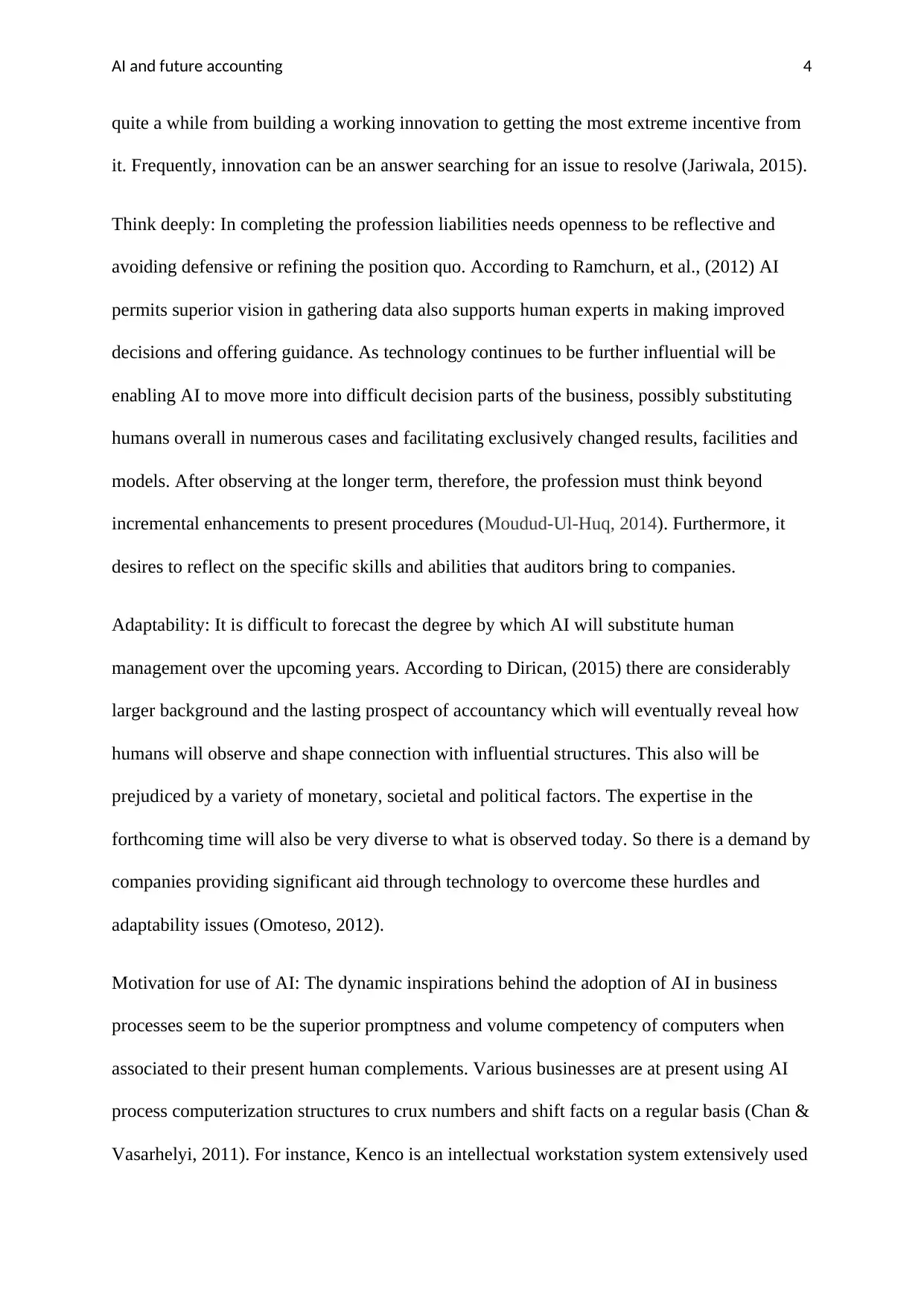
AI and future accounting 4
quite a while from building a working innovation to getting the most extreme incentive from
it. Frequently, innovation can be an answer searching for an issue to resolve (Jariwala, 2015).
Think deeply: In completing the profession liabilities needs openness to be reflective and
avoiding defensive or refining the position quo. According to Ramchurn, et al., (2012) AI
permits superior vision in gathering data also supports human experts in making improved
decisions and offering guidance. As technology continues to be further influential will be
enabling AI to move more into difficult decision parts of the business, possibly substituting
humans overall in numerous cases and facilitating exclusively changed results, facilities and
models. After observing at the longer term, therefore, the profession must think beyond
incremental enhancements to present procedures (Moudud-Ul-Huq, 2014). Furthermore, it
desires to reflect on the specific skills and abilities that auditors bring to companies.
Adaptability: It is difficult to forecast the degree by which AI will substitute human
management over the upcoming years. According to Dirican, (2015) there are considerably
larger background and the lasting prospect of accountancy which will eventually reveal how
humans will observe and shape connection with influential structures. This also will be
prejudiced by a variety of monetary, societal and political factors. The expertise in the
forthcoming time will also be very diverse to what is observed today. So there is a demand by
companies providing significant aid through technology to overcome these hurdles and
adaptability issues (Omoteso, 2012).
Motivation for use of AI: The dynamic inspirations behind the adoption of AI in business
processes seem to be the superior promptness and volume competency of computers when
associated to their present human complements. Various businesses are at present using AI
process computerization structures to crux numbers and shift facts on a regular basis (Chan &
Vasarhelyi, 2011). For instance, Kenco is an intellectual workstation system extensively used
quite a while from building a working innovation to getting the most extreme incentive from
it. Frequently, innovation can be an answer searching for an issue to resolve (Jariwala, 2015).
Think deeply: In completing the profession liabilities needs openness to be reflective and
avoiding defensive or refining the position quo. According to Ramchurn, et al., (2012) AI
permits superior vision in gathering data also supports human experts in making improved
decisions and offering guidance. As technology continues to be further influential will be
enabling AI to move more into difficult decision parts of the business, possibly substituting
humans overall in numerous cases and facilitating exclusively changed results, facilities and
models. After observing at the longer term, therefore, the profession must think beyond
incremental enhancements to present procedures (Moudud-Ul-Huq, 2014). Furthermore, it
desires to reflect on the specific skills and abilities that auditors bring to companies.
Adaptability: It is difficult to forecast the degree by which AI will substitute human
management over the upcoming years. According to Dirican, (2015) there are considerably
larger background and the lasting prospect of accountancy which will eventually reveal how
humans will observe and shape connection with influential structures. This also will be
prejudiced by a variety of monetary, societal and political factors. The expertise in the
forthcoming time will also be very diverse to what is observed today. So there is a demand by
companies providing significant aid through technology to overcome these hurdles and
adaptability issues (Omoteso, 2012).
Motivation for use of AI: The dynamic inspirations behind the adoption of AI in business
processes seem to be the superior promptness and volume competency of computers when
associated to their present human complements. Various businesses are at present using AI
process computerization structures to crux numbers and shift facts on a regular basis (Chan &
Vasarhelyi, 2011). For instance, Kenco is an intellectual workstation system extensively used
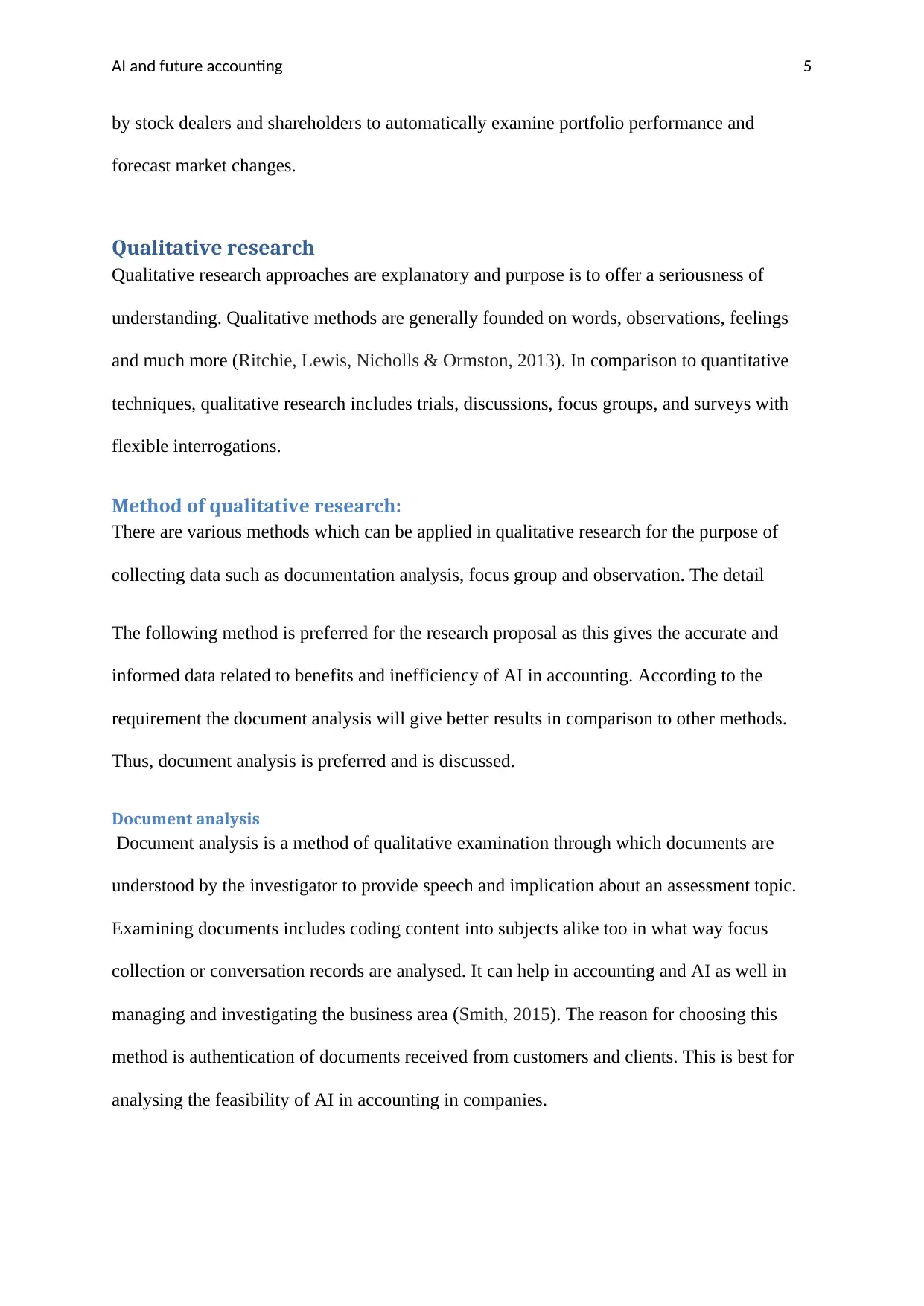
AI and future accounting 5
by stock dealers and shareholders to automatically examine portfolio performance and
forecast market changes.
Qualitative research
Qualitative research approaches are explanatory and purpose is to offer a seriousness of
understanding. Qualitative methods are generally founded on words, observations, feelings
and much more (Ritchie, Lewis, Nicholls & Ormston, 2013). In comparison to quantitative
techniques, qualitative research includes trials, discussions, focus groups, and surveys with
flexible interrogations.
Method of qualitative research:
There are various methods which can be applied in qualitative research for the purpose of
collecting data such as documentation analysis, focus group and observation. The detail
The following method is preferred for the research proposal as this gives the accurate and
informed data related to benefits and inefficiency of AI in accounting. According to the
requirement the document analysis will give better results in comparison to other methods.
Thus, document analysis is preferred and is discussed.
Document analysis
Document analysis is a method of qualitative examination through which documents are
understood by the investigator to provide speech and implication about an assessment topic.
Examining documents includes coding content into subjects alike too in what way focus
collection or conversation records are analysed. It can help in accounting and AI as well in
managing and investigating the business area (Smith, 2015). The reason for choosing this
method is authentication of documents received from customers and clients. This is best for
analysing the feasibility of AI in accounting in companies.
by stock dealers and shareholders to automatically examine portfolio performance and
forecast market changes.
Qualitative research
Qualitative research approaches are explanatory and purpose is to offer a seriousness of
understanding. Qualitative methods are generally founded on words, observations, feelings
and much more (Ritchie, Lewis, Nicholls & Ormston, 2013). In comparison to quantitative
techniques, qualitative research includes trials, discussions, focus groups, and surveys with
flexible interrogations.
Method of qualitative research:
There are various methods which can be applied in qualitative research for the purpose of
collecting data such as documentation analysis, focus group and observation. The detail
The following method is preferred for the research proposal as this gives the accurate and
informed data related to benefits and inefficiency of AI in accounting. According to the
requirement the document analysis will give better results in comparison to other methods.
Thus, document analysis is preferred and is discussed.
Document analysis
Document analysis is a method of qualitative examination through which documents are
understood by the investigator to provide speech and implication about an assessment topic.
Examining documents includes coding content into subjects alike too in what way focus
collection or conversation records are analysed. It can help in accounting and AI as well in
managing and investigating the business area (Smith, 2015). The reason for choosing this
method is authentication of documents received from customers and clients. This is best for
analysing the feasibility of AI in accounting in companies.
⊘ This is a preview!⊘
Do you want full access?
Subscribe today to unlock all pages.

Trusted by 1+ million students worldwide
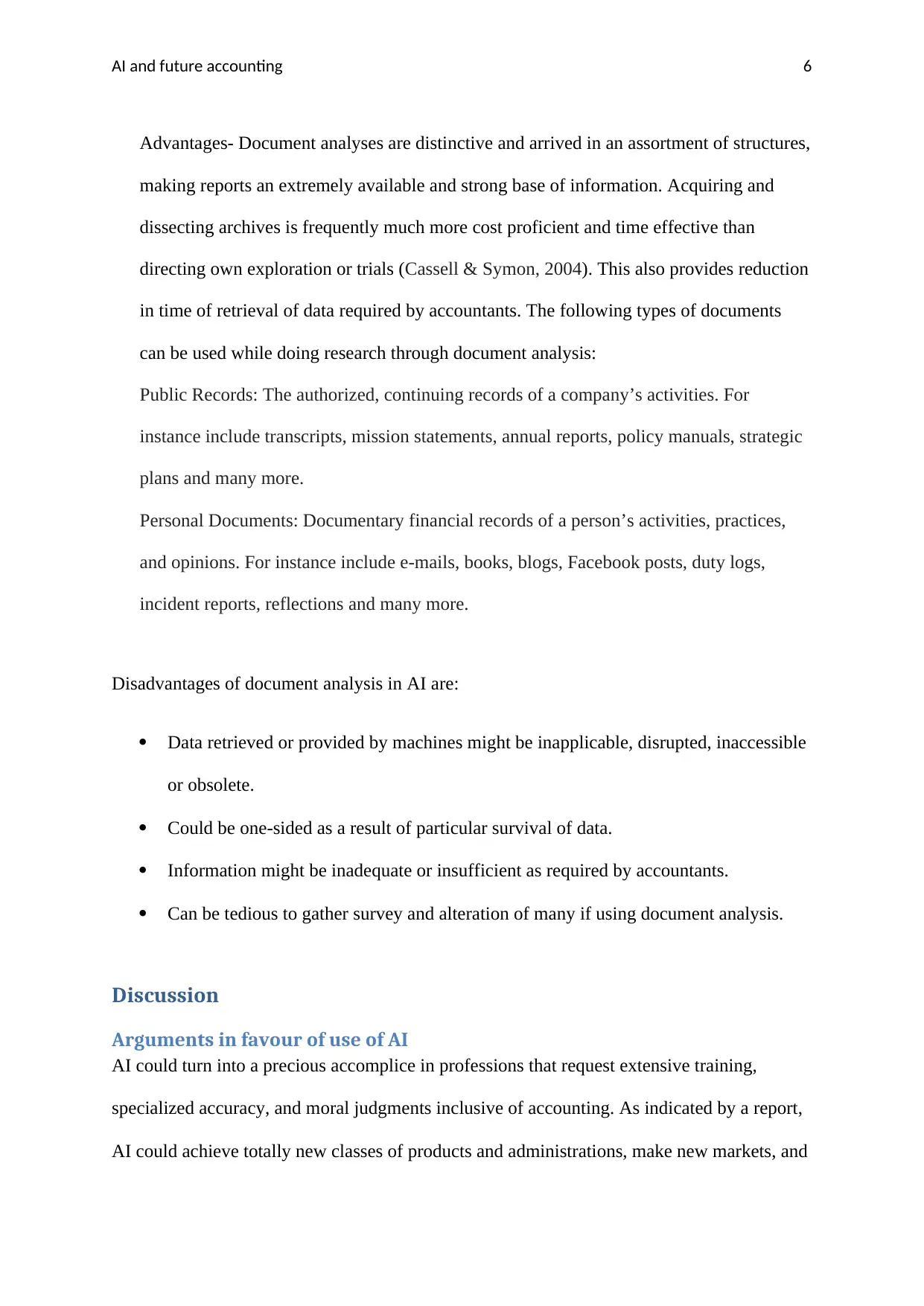
AI and future accounting 6
Advantages- Document analyses are distinctive and arrived in an assortment of structures,
making reports an extremely available and strong base of information. Acquiring and
dissecting archives is frequently much more cost proficient and time effective than
directing own exploration or trials (Cassell & Symon, 2004). This also provides reduction
in time of retrieval of data required by accountants. The following types of documents
can be used while doing research through document analysis:
Public Records: The authorized, continuing records of a company’s activities. For
instance include transcripts, mission statements, annual reports, policy manuals, strategic
plans and many more.
Personal Documents: Documentary financial records of a person’s activities, practices,
and opinions. For instance include e-mails, books, blogs, Facebook posts, duty logs,
incident reports, reflections and many more.
Disadvantages of document analysis in AI are:
Data retrieved or provided by machines might be inapplicable, disrupted, inaccessible
or obsolete.
Could be one-sided as a result of particular survival of data.
Information might be inadequate or insufficient as required by accountants.
Can be tedious to gather survey and alteration of many if using document analysis.
Discussion
Arguments in favour of use of AI
AI could turn into a precious accomplice in professions that request extensive training,
specialized accuracy, and moral judgments inclusive of accounting. As indicated by a report,
AI could achieve totally new classes of products and administrations, make new markets, and
Advantages- Document analyses are distinctive and arrived in an assortment of structures,
making reports an extremely available and strong base of information. Acquiring and
dissecting archives is frequently much more cost proficient and time effective than
directing own exploration or trials (Cassell & Symon, 2004). This also provides reduction
in time of retrieval of data required by accountants. The following types of documents
can be used while doing research through document analysis:
Public Records: The authorized, continuing records of a company’s activities. For
instance include transcripts, mission statements, annual reports, policy manuals, strategic
plans and many more.
Personal Documents: Documentary financial records of a person’s activities, practices,
and opinions. For instance include e-mails, books, blogs, Facebook posts, duty logs,
incident reports, reflections and many more.
Disadvantages of document analysis in AI are:
Data retrieved or provided by machines might be inapplicable, disrupted, inaccessible
or obsolete.
Could be one-sided as a result of particular survival of data.
Information might be inadequate or insufficient as required by accountants.
Can be tedious to gather survey and alteration of many if using document analysis.
Discussion
Arguments in favour of use of AI
AI could turn into a precious accomplice in professions that request extensive training,
specialized accuracy, and moral judgments inclusive of accounting. As indicated by a report,
AI could achieve totally new classes of products and administrations, make new markets, and
Paraphrase This Document
Need a fresh take? Get an instant paraphrase of this document with our AI Paraphraser
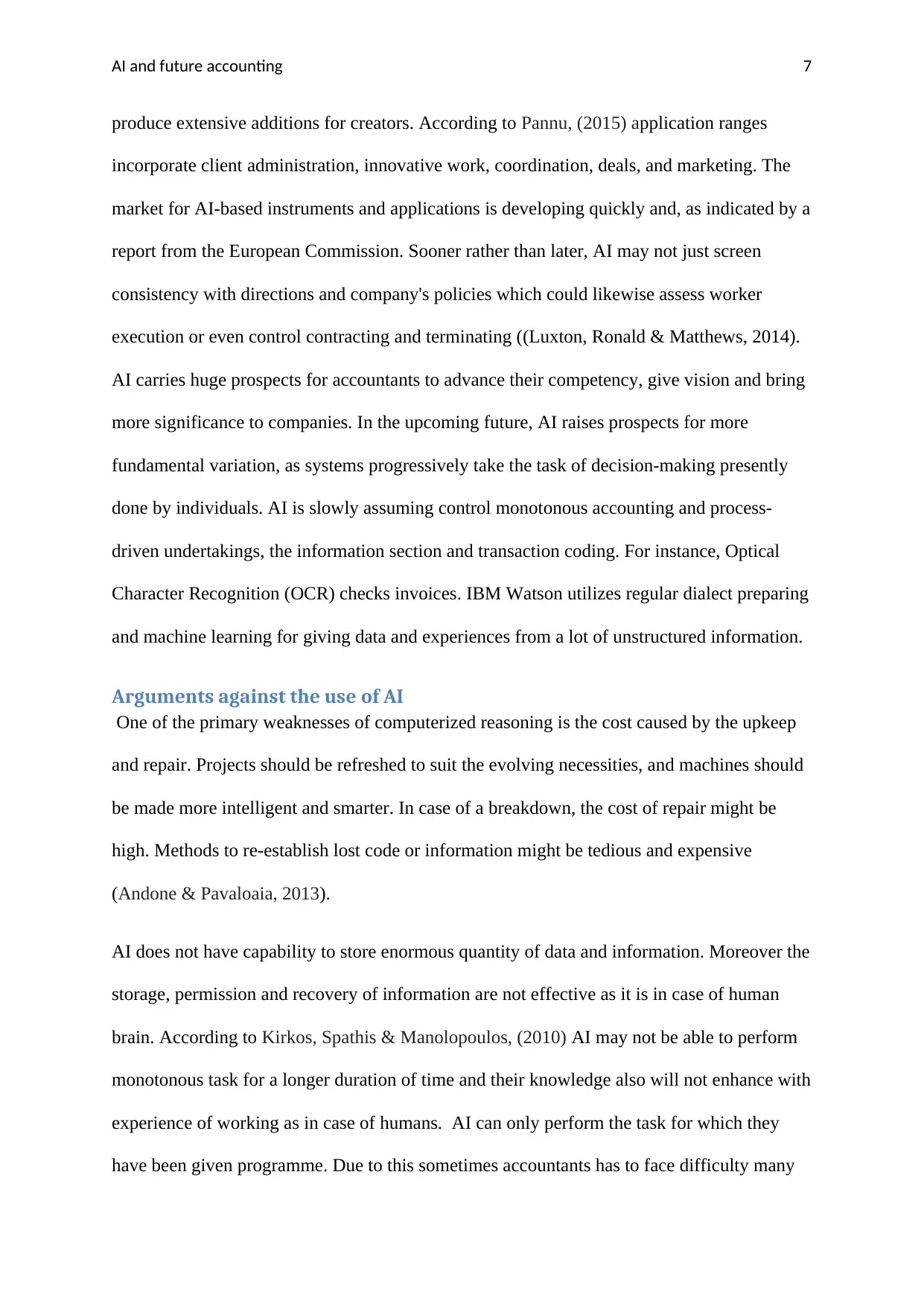
AI and future accounting 7
produce extensive additions for creators. According to Pannu, (2015) application ranges
incorporate client administration, innovative work, coordination, deals, and marketing. The
market for AI-based instruments and applications is developing quickly and, as indicated by a
report from the European Commission. Sooner rather than later, AI may not just screen
consistency with directions and company's policies which could likewise assess worker
execution or even control contracting and terminating ((Luxton, Ronald & Matthews, 2014).
AI carries huge prospects for accountants to advance their competency, give vision and bring
more significance to companies. In the upcoming future, AI raises prospects for more
fundamental variation, as systems progressively take the task of decision-making presently
done by individuals. AI is slowly assuming control monotonous accounting and process-
driven undertakings, the information section and transaction coding. For instance, Optical
Character Recognition (OCR) checks invoices. IBM Watson utilizes regular dialect preparing
and machine learning for giving data and experiences from a lot of unstructured information.
Arguments against the use of AI
One of the primary weaknesses of computerized reasoning is the cost caused by the upkeep
and repair. Projects should be refreshed to suit the evolving necessities, and machines should
be made more intelligent and smarter. In case of a breakdown, the cost of repair might be
high. Methods to re-establish lost code or information might be tedious and expensive
(Andone & Pavaloaia, 2013).
AI does not have capability to store enormous quantity of data and information. Moreover the
storage, permission and recovery of information are not effective as it is in case of human
brain. According to Kirkos, Spathis & Manolopoulos, (2010) AI may not be able to perform
monotonous task for a longer duration of time and their knowledge also will not enhance with
experience of working as in case of humans. AI can only perform the task for which they
have been given programme. Due to this sometimes accountants has to face difficulty many
produce extensive additions for creators. According to Pannu, (2015) application ranges
incorporate client administration, innovative work, coordination, deals, and marketing. The
market for AI-based instruments and applications is developing quickly and, as indicated by a
report from the European Commission. Sooner rather than later, AI may not just screen
consistency with directions and company's policies which could likewise assess worker
execution or even control contracting and terminating ((Luxton, Ronald & Matthews, 2014).
AI carries huge prospects for accountants to advance their competency, give vision and bring
more significance to companies. In the upcoming future, AI raises prospects for more
fundamental variation, as systems progressively take the task of decision-making presently
done by individuals. AI is slowly assuming control monotonous accounting and process-
driven undertakings, the information section and transaction coding. For instance, Optical
Character Recognition (OCR) checks invoices. IBM Watson utilizes regular dialect preparing
and machine learning for giving data and experiences from a lot of unstructured information.
Arguments against the use of AI
One of the primary weaknesses of computerized reasoning is the cost caused by the upkeep
and repair. Projects should be refreshed to suit the evolving necessities, and machines should
be made more intelligent and smarter. In case of a breakdown, the cost of repair might be
high. Methods to re-establish lost code or information might be tedious and expensive
(Andone & Pavaloaia, 2013).
AI does not have capability to store enormous quantity of data and information. Moreover the
storage, permission and recovery of information are not effective as it is in case of human
brain. According to Kirkos, Spathis & Manolopoulos, (2010) AI may not be able to perform
monotonous task for a longer duration of time and their knowledge also will not enhance with
experience of working as in case of humans. AI can only perform the task for which they
have been given programme. Due to this sometimes accountants has to face difficulty many
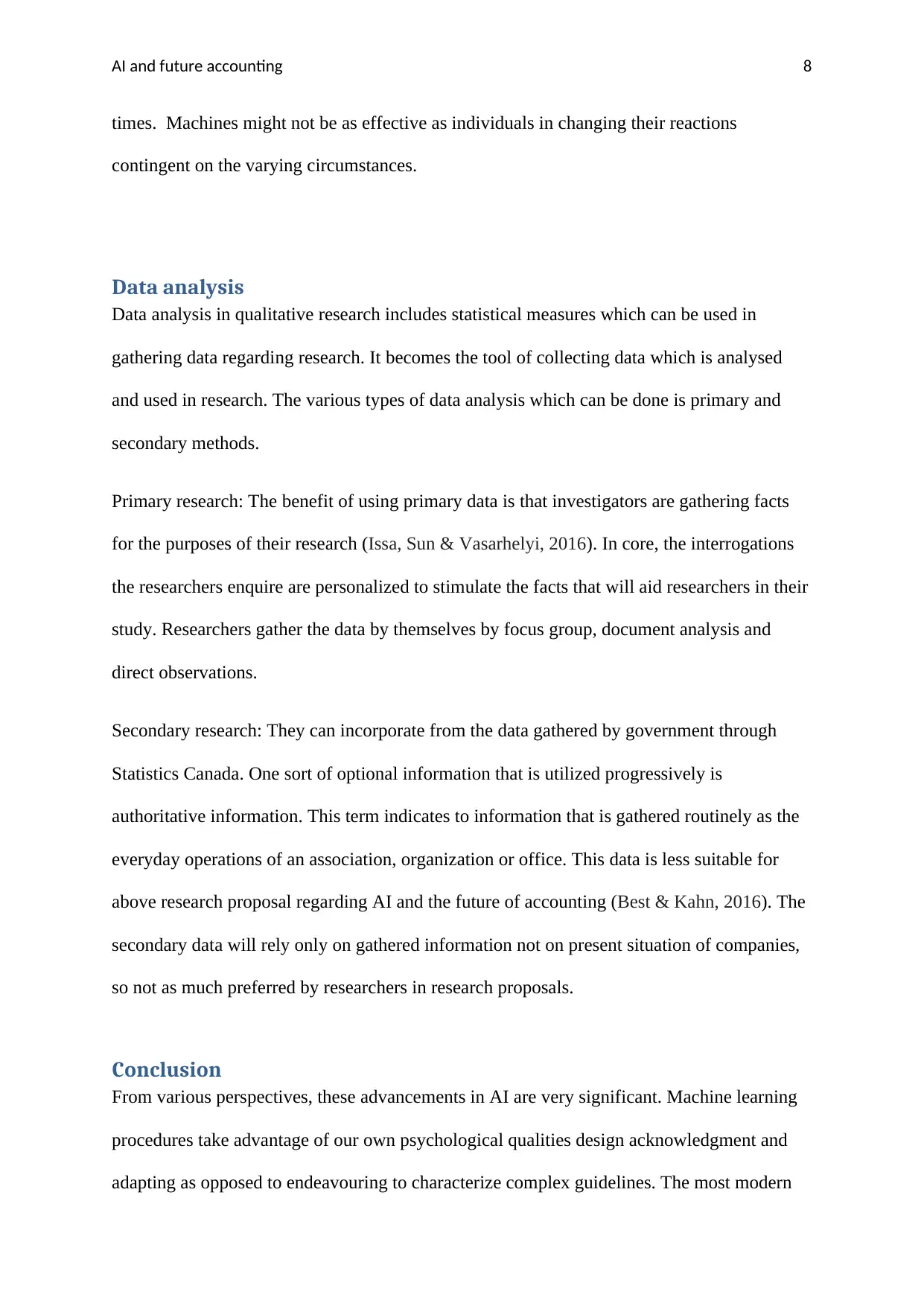
AI and future accounting 8
times. Machines might not be as effective as individuals in changing their reactions
contingent on the varying circumstances.
Data analysis
Data analysis in qualitative research includes statistical measures which can be used in
gathering data regarding research. It becomes the tool of collecting data which is analysed
and used in research. The various types of data analysis which can be done is primary and
secondary methods.
Primary research: The benefit of using primary data is that investigators are gathering facts
for the purposes of their research (Issa, Sun & Vasarhelyi, 2016). In core, the interrogations
the researchers enquire are personalized to stimulate the facts that will aid researchers in their
study. Researchers gather the data by themselves by focus group, document analysis and
direct observations.
Secondary research: They can incorporate from the data gathered by government through
Statistics Canada. One sort of optional information that is utilized progressively is
authoritative information. This term indicates to information that is gathered routinely as the
everyday operations of an association, organization or office. This data is less suitable for
above research proposal regarding AI and the future of accounting (Best & Kahn, 2016). The
secondary data will rely only on gathered information not on present situation of companies,
so not as much preferred by researchers in research proposals.
Conclusion
From various perspectives, these advancements in AI are very significant. Machine learning
procedures take advantage of our own psychological qualities design acknowledgment and
adapting as opposed to endeavouring to characterize complex guidelines. The most modern
times. Machines might not be as effective as individuals in changing their reactions
contingent on the varying circumstances.
Data analysis
Data analysis in qualitative research includes statistical measures which can be used in
gathering data regarding research. It becomes the tool of collecting data which is analysed
and used in research. The various types of data analysis which can be done is primary and
secondary methods.
Primary research: The benefit of using primary data is that investigators are gathering facts
for the purposes of their research (Issa, Sun & Vasarhelyi, 2016). In core, the interrogations
the researchers enquire are personalized to stimulate the facts that will aid researchers in their
study. Researchers gather the data by themselves by focus group, document analysis and
direct observations.
Secondary research: They can incorporate from the data gathered by government through
Statistics Canada. One sort of optional information that is utilized progressively is
authoritative information. This term indicates to information that is gathered routinely as the
everyday operations of an association, organization or office. This data is less suitable for
above research proposal regarding AI and the future of accounting (Best & Kahn, 2016). The
secondary data will rely only on gathered information not on present situation of companies,
so not as much preferred by researchers in research proposals.
Conclusion
From various perspectives, these advancements in AI are very significant. Machine learning
procedures take advantage of our own psychological qualities design acknowledgment and
adapting as opposed to endeavouring to characterize complex guidelines. The most modern
⊘ This is a preview!⊘
Do you want full access?
Subscribe today to unlock all pages.

Trusted by 1+ million students worldwide

AI and future accounting 9
strategies here in view of manufactured neural nets and profound learning is empowering
major leaps forward in regions for example, language processing, interpretation, machine
vision and video game playing.
strategies here in view of manufactured neural nets and profound learning is empowering
major leaps forward in regions for example, language processing, interpretation, machine
vision and video game playing.
Paraphrase This Document
Need a fresh take? Get an instant paraphrase of this document with our AI Paraphraser
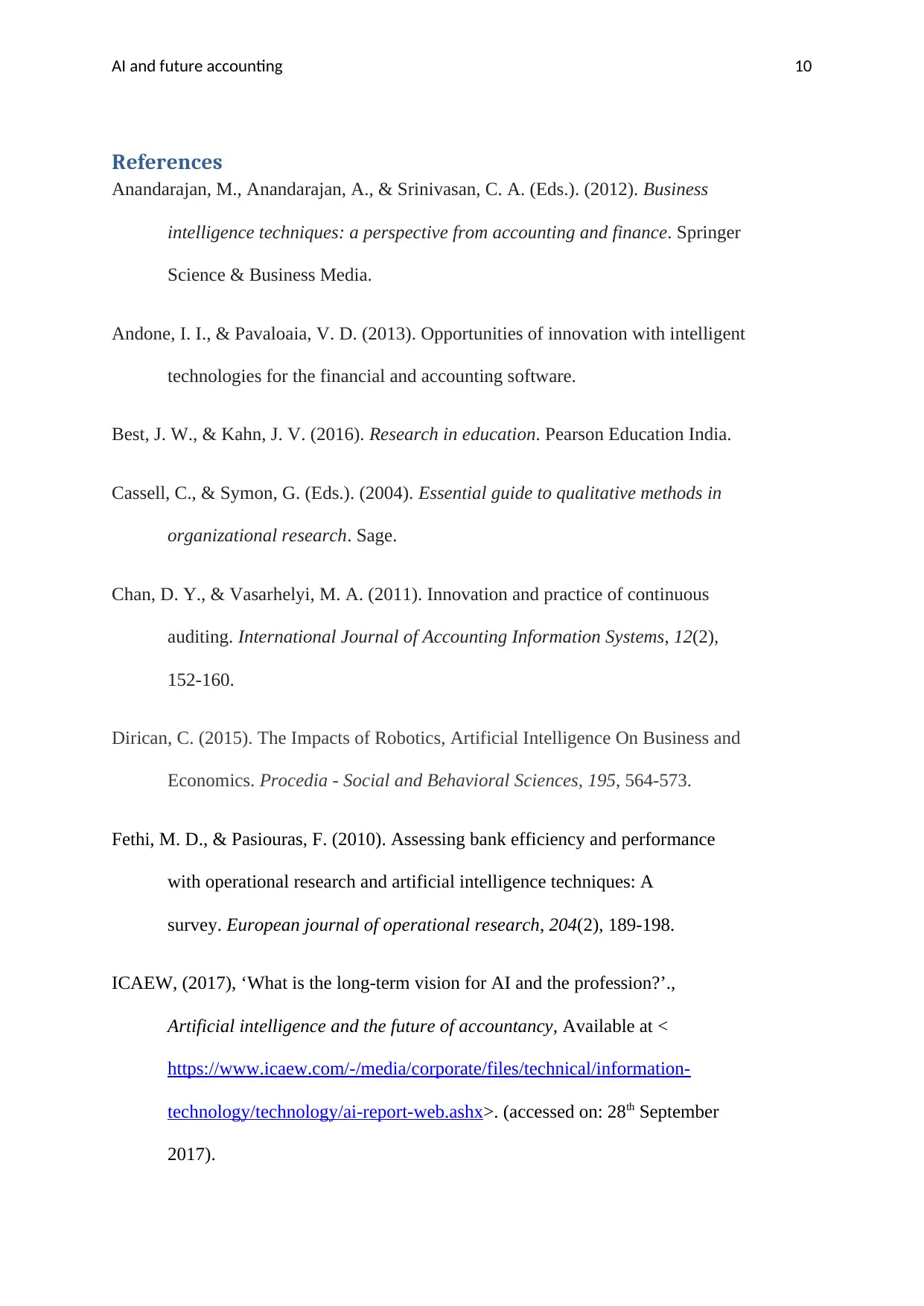
AI and future accounting 10
References
Anandarajan, M., Anandarajan, A., & Srinivasan, C. A. (Eds.). (2012). Business
intelligence techniques: a perspective from accounting and finance. Springer
Science & Business Media.
Andone, I. I., & Pavaloaia, V. D. (2013). Opportunities of innovation with intelligent
technologies for the financial and accounting software.
Best, J. W., & Kahn, J. V. (2016). Research in education. Pearson Education India.
Cassell, C., & Symon, G. (Eds.). (2004). Essential guide to qualitative methods in
organizational research. Sage.
Chan, D. Y., & Vasarhelyi, M. A. (2011). Innovation and practice of continuous
auditing. International Journal of Accounting Information Systems, 12(2),
152-160.
Dirican, C. (2015). The Impacts of Robotics, Artificial Intelligence On Business and
Economics. Procedia - Social and Behavioral Sciences, 195, 564-573.
Fethi, M. D., & Pasiouras, F. (2010). Assessing bank efficiency and performance
with operational research and artificial intelligence techniques: A
survey. European journal of operational research, 204(2), 189-198.
ICAEW, (2017), ‘What is the long-term vision for AI and the profession?’.,
Artificial intelligence and the future of accountancy, Available at <
https://www.icaew.com/-/media/corporate/files/technical/information-
technology/technology/ai-report-web.ashx>. (accessed on: 28th September
2017).
References
Anandarajan, M., Anandarajan, A., & Srinivasan, C. A. (Eds.). (2012). Business
intelligence techniques: a perspective from accounting and finance. Springer
Science & Business Media.
Andone, I. I., & Pavaloaia, V. D. (2013). Opportunities of innovation with intelligent
technologies for the financial and accounting software.
Best, J. W., & Kahn, J. V. (2016). Research in education. Pearson Education India.
Cassell, C., & Symon, G. (Eds.). (2004). Essential guide to qualitative methods in
organizational research. Sage.
Chan, D. Y., & Vasarhelyi, M. A. (2011). Innovation and practice of continuous
auditing. International Journal of Accounting Information Systems, 12(2),
152-160.
Dirican, C. (2015). The Impacts of Robotics, Artificial Intelligence On Business and
Economics. Procedia - Social and Behavioral Sciences, 195, 564-573.
Fethi, M. D., & Pasiouras, F. (2010). Assessing bank efficiency and performance
with operational research and artificial intelligence techniques: A
survey. European journal of operational research, 204(2), 189-198.
ICAEW, (2017), ‘What is the long-term vision for AI and the profession?’.,
Artificial intelligence and the future of accountancy, Available at <
https://www.icaew.com/-/media/corporate/files/technical/information-
technology/technology/ai-report-web.ashx>. (accessed on: 28th September
2017).
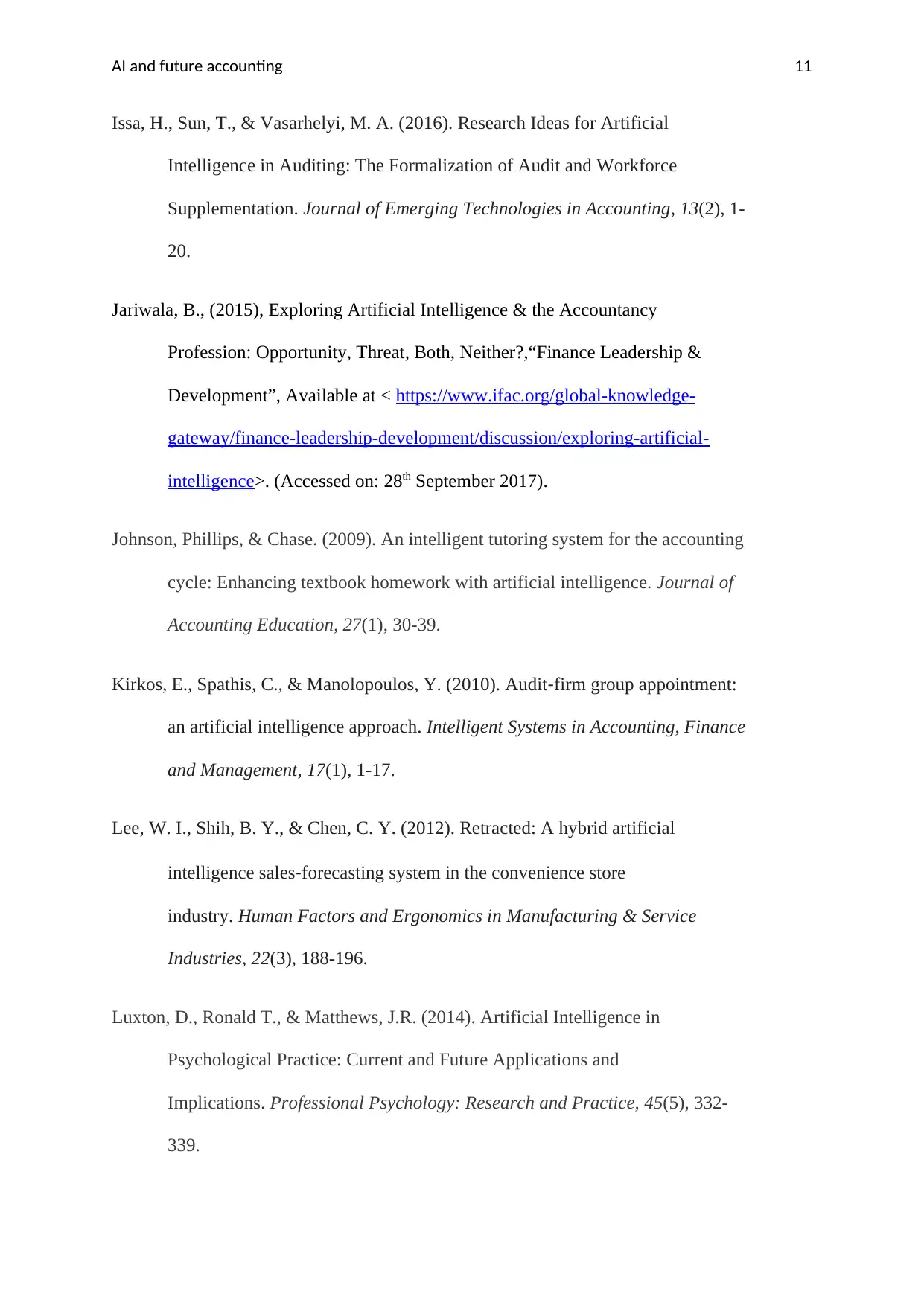
AI and future accounting 11
Issa, H., Sun, T., & Vasarhelyi, M. A. (2016). Research Ideas for Artificial
Intelligence in Auditing: The Formalization of Audit and Workforce
Supplementation. Journal of Emerging Technologies in Accounting, 13(2), 1-
20.
Jariwala, B., (2015), Exploring Artificial Intelligence & the Accountancy
Profession: Opportunity, Threat, Both, Neither?,“Finance Leadership &
Development”, Available at < https://www.ifac.org/global-knowledge-
gateway/finance-leadership-development/discussion/exploring-artificial-
intelligence>. (Accessed on: 28th September 2017).
Johnson, Phillips, & Chase. (2009). An intelligent tutoring system for the accounting
cycle: Enhancing textbook homework with artificial intelligence. Journal of
Accounting Education, 27(1), 30-39.
Kirkos, E., Spathis, C., & Manolopoulos, Y. (2010). Audit‐firm group appointment:
an artificial intelligence approach. Intelligent Systems in Accounting, Finance
and Management, 17(1), 1-17.
Lee, W. I., Shih, B. Y., & Chen, C. Y. (2012). Retracted: A hybrid artificial
intelligence sales‐forecasting system in the convenience store
industry. Human Factors and Ergonomics in Manufacturing & Service
Industries, 22(3), 188-196.
Luxton, D., Ronald T., & Matthews, J.R. (2014). Artificial Intelligence in
Psychological Practice: Current and Future Applications and
Implications. Professional Psychology: Research and Practice, 45(5), 332-
339.
Issa, H., Sun, T., & Vasarhelyi, M. A. (2016). Research Ideas for Artificial
Intelligence in Auditing: The Formalization of Audit and Workforce
Supplementation. Journal of Emerging Technologies in Accounting, 13(2), 1-
20.
Jariwala, B., (2015), Exploring Artificial Intelligence & the Accountancy
Profession: Opportunity, Threat, Both, Neither?,“Finance Leadership &
Development”, Available at < https://www.ifac.org/global-knowledge-
gateway/finance-leadership-development/discussion/exploring-artificial-
intelligence>. (Accessed on: 28th September 2017).
Johnson, Phillips, & Chase. (2009). An intelligent tutoring system for the accounting
cycle: Enhancing textbook homework with artificial intelligence. Journal of
Accounting Education, 27(1), 30-39.
Kirkos, E., Spathis, C., & Manolopoulos, Y. (2010). Audit‐firm group appointment:
an artificial intelligence approach. Intelligent Systems in Accounting, Finance
and Management, 17(1), 1-17.
Lee, W. I., Shih, B. Y., & Chen, C. Y. (2012). Retracted: A hybrid artificial
intelligence sales‐forecasting system in the convenience store
industry. Human Factors and Ergonomics in Manufacturing & Service
Industries, 22(3), 188-196.
Luxton, D., Ronald T., & Matthews, J.R. (2014). Artificial Intelligence in
Psychological Practice: Current and Future Applications and
Implications. Professional Psychology: Research and Practice, 45(5), 332-
339.
⊘ This is a preview!⊘
Do you want full access?
Subscribe today to unlock all pages.

Trusted by 1+ million students worldwide
1 out of 15
Related Documents
Your All-in-One AI-Powered Toolkit for Academic Success.
+13062052269
info@desklib.com
Available 24*7 on WhatsApp / Email
![[object Object]](/_next/static/media/star-bottom.7253800d.svg)
Unlock your academic potential
Copyright © 2020–2026 A2Z Services. All Rights Reserved. Developed and managed by ZUCOL.





